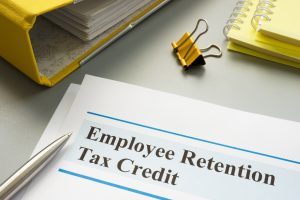The IRS warns businesses about ERTC scams – part one
 Nowadays, businesses are allegedly missing out on the lucrative Employee Retention Tax Credit (ERTC). This allegation comes from numerous advertisements that flood the airwaves and online. Although some employers still qualify for the ERTC, the IRS continues to warn companies about third-party scams. While nothing is wrong with claiming credits you are entitled to, those who incorrectly claim the ERTC risk getting into trouble with the IRS. Cash flow issues may proceed as a result. Understanding the following information can help lower your risk.
Nowadays, businesses are allegedly missing out on the lucrative Employee Retention Tax Credit (ERTC). This allegation comes from numerous advertisements that flood the airwaves and online. Although some employers still qualify for the ERTC, the IRS continues to warn companies about third-party scams. While nothing is wrong with claiming credits you are entitled to, those who incorrectly claim the ERTC risk getting into trouble with the IRS. Cash flow issues may proceed as a result. Understanding the following information can help lower your risk.
The Employee Retention Tax Credit
The ERTC is a refundable tax credit designed for companies that:
- Paid staff when closed due to the pandemic in 2020 and 2021; or
- Saw material drops in gross receipts from March 13, 2020, to December 31, 2021. Qualified firms may receive credits worth up to $26,000 per retained employee.
A modified tax return may still be eligible to claim the credit. But the conditions are stringent. You need to possess the following:
- Sustained a full or partial shutdown as a result of official directives restricting trade, travel, or group gatherings because of COVID-19 in 2020 or the first three quarters of 2021,
- Experienced a significant decline in gross receipts in 2020 or the first three quarters of 2021,
- Or qualified as a recovery startup business for the third or fourth quarters of 2021, which can claim a credit of up to $50,000 total per quarter without demonstrating suspended operations or reduced receipts. (Startups that qualify for the ERTC must have been in operation for at least three tax years before the quarter for which they claim the ERTC and have annual gross receipts of less than or equal to $1 million.)
Additionally, a company cannot claim the ERTC on wages used to qualify for the Paycheck Protection Program (PPP) loan forgiveness or other tax credits. In that application, they would be payroll costs. A business must also subtract the amount of credits from the wage deductions it claims on its federal income tax return.
Prevalence of ERTC scams
Due to the ERTC’s potential high value and the fact that employers can still claim it through amended returns through April 15, 2025, a cottage industry of dishonest promoters who promise to assist firms in claiming the credit has emerged. These con artists use false claims and exaggerated guarantees to lure unsuspecting customers into their trap. In exchange, they receive obscene upfront fees that can run into thousands of dollars or commissions, reaching 25% of the refund.
The IRS has referred to the credit’s false promotion as “staggering.” For instance, contrary to advice from some marketers, the tax office clarified in recent guidance that supply chain interruptions typically only qualify an employer for the credit if a government order caused the disruptions. The credit only applies if the employer had to suspend operations because a government order forced it. It is not sufficient for an employer to have done so due to disturbances.
The IRS’s annual “Dirty Dozen” list of the top tax frauds in the nation now includes ERTC scams. The U.S. Department of Justice has accused two promoters in Utah, who operated under the name “1099 Tax Pros,” of taking part in a fraudulent tax scam by drafting and submitting more than 1,000 applications to the IRS. For their clients, they submitted bogus claims for over $11 million in ERTCs and salary credits for sick and family leave tied to COVID.
More to come
Fraudsters have taken advantage of the ambiguity and overall misunderstanding surrounding the ERTC. According to a recent congressional hearing, some issues can be attributed to the credit’s wholly paper application procedure. With over 2.5 million claims submitted, there is a backlog of nearly 500,000 claims that have yet to be processed.
The IRS did not clarify how much progress it has made in clearing the backlog. Still, the organization has declared that a new phase of increased ERTC claim inspection has begun. To cope with fraud in the program, it is tightening up its compliance activities and implementing new procedures. With a focus on the promoters and the companies making questionable claims, the IRS has already stepped up its audit and criminal investigative activity on ERTC claims. Do not hesitate to contact RRBB Advisors with any questions. In the meantime, keep an eye out for part two of this two-part blog post for more information!
© 2023
RRBB eNEWSLETTER
Get free tax planning and financial advice




